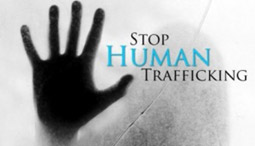September 24, 2018
Mercy Day
By Marianne Comfort, Institute Justice Team, Sisters of Mercy of the Americas
 I suspect that a lot of that forced labor was made up of children picking cotton in the fields of Uzbek for my clothes. After all, I don’t wear any makeup, so don’t depend on children mining the mica that makes cosmetics sparkle. I don’t own rubies, extracted by forced labor in Burma. And I own only minimal gadgets that depend on components mined by slaves in the Democratic Republic of Congo. But when I looked on the map of where the forced labor I depend on is located, I found a few spots in North and South America, which I’m guessing represents some of my food purchases.
I suspect that a lot of that forced labor was made up of children picking cotton in the fields of Uzbek for my clothes. After all, I don’t wear any makeup, so don’t depend on children mining the mica that makes cosmetics sparkle. I don’t own rubies, extracted by forced labor in Burma. And I own only minimal gadgets that depend on components mined by slaves in the Democratic Republic of Congo. But when I looked on the map of where the forced labor I depend on is located, I found a few spots in North and South America, which I’m guessing represents some of my food purchases.
I learned about this consciousness-raising online tool at a recent conference on human trafficking sponsored by Catholic University’s Institute for Policy Research and Catholic Studies and the Franciscan Action Network.
Ambassador Luis CdeBaca, director of the U.S. State Department’s Office to Monitor and Combat Trafficking in Human Persons, talked about his own disappointment in learning that McDonald’s fish fillets are caught off the shores of New Zealand by enslaved workers who are sometimes abandoned on icebergs as punishment for demanding wages.
He urged faith groups to maintain outrage over instances of human trafficking and to call it exactly what it is, the evil of modern slavery. He also urged us as consumers to ask managers of our favorite stores where their products or the materials in their products originate, to keep up pressure for slave-free products.
At the conference we learned of numerous cases of human trafficking in the U.S. There were the 56 deaf and mute Mexicans forced to beg on the New York City subways; Malaysians crowded into trucks for the drive from Philadelphia to New Jersey chicken processing plants; Chinese women chained to sewing machines 16 hours a day.
But the stories that participants kept talking about were those of Sarah, Saba and Benjamin, who courageously shared their experiences of torture and human trafficking. Each of them had endured the horrors of torture in Ethiopia, arduous travels through multiple countries and payments of thousands of dollars to smugglers and, then, when they finally made it across the border into the United States, expecting freedom and human dignity, they were traumatized once again by the immigration detention system.
One woman recounted being kept by immigration officials in a cold room of a facility in California with many other women for 10 days, with little food. Her interpreter kept repeating the word “disgusting” to describe the conditions. She then demonstrated how her legs and arms were bound when she was then transferred to another facility in Arizona. She said she had better treatment when traveling through Panama and Mexico.
Demissie Abebe, director of the Torture Abolition and Survivors Support Coalition, which has been providing services for these three victims and others, explained that it was too painful for many to share details of their torture and trafficking experiences. But he said that those experiences are often linked, as human smugglers offer torture victims a way out of their suffering with enticements of escape for a fee. The traffickers then end up exploiting them and often subjecting them to more physical and sexual abuse, and the payments and abuse add up as the victims are handed off from one smuggler to another throughout their journey through many countries.
He also talked of Ethiopian, Iranian and Iraqi immigrants who when they achieved U.S. citizenship returned to their home countries and offered desperate people transportation to the United States if they would work for free for a couple of years. He talked of girls as young as 11 smuggled here and held as virtual captives for 10 years.
CdeBaca said that non-governmental organizations play a key role in preventing human trafficking in the first place, by offering hope and opportunity to people in desperate situations so that they don’t succumb to the promises of smugglers.
Persons of faith also can patronize businesses that are addressing human trafficking, such as the Body Shop, which trains all of its employees on the origins of its products and the importance of a slave-free supply chain. Later in the day, we learned of hotels and one U.S.-based airline, Delta, that have signed a code of conduct for the protection of children from sexual exploitation in travel and tourism.
Join the Sisters of Mercy in combating human trafficking: